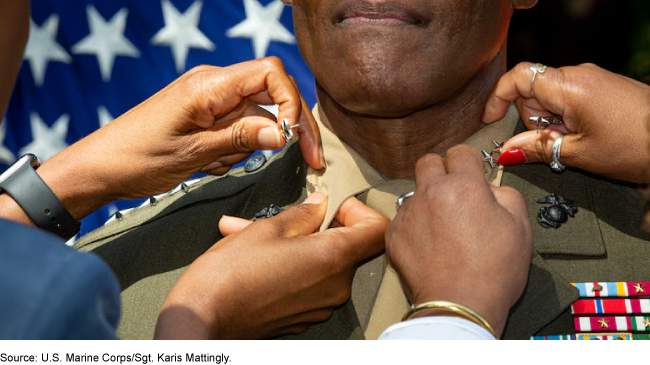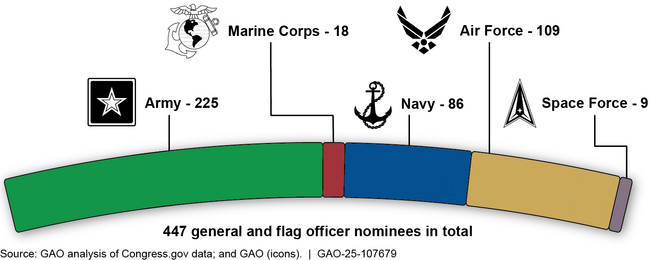Military Generals and Admirals: Information on the Effects of Senate Nomination Blanket Holds
Fast Facts
The Senate must vote on whether to confirm nominations for generals and admirals. On two occasions since 2020, a Senator put a "hold" on the confirmation process. One hold in 2023 lasted 10 months, affecting 447 nominees. Department of Defense senior leaders said this hold weakened national security.
In this Q&A, we found the hold didn't stop military units from completing missions. It did affect DOD leadership continuity, career progression, and some families—e.g., by delaying planned moves. DOD took steps to lessen these effects by adjusting assignments, delaying retirements, and using civilian leaders in acting roles.
Promotion Ceremony for a Marine Corps Four-Star General

Highlights
What GAO Found
The Senate, in its capacity to give advice and consent to the President on appointing officers of the United States, must vote to confirm all nominations for senior military leaders, known as general and flag officers (GFO), that the President has approved. During the confirmation process, a Senator can object to approving nominations through Senate procedures, thereby placing a “hold” on them. When a Senator objects to a category of nominations, such as all GFOs, this is known as a “blanket hold.” Since 2014, GAO identified two occasions—in 2020 and 2023—where GFO nominations were on a blanket hold from Senate confirmation. GAO found that
- for 14 days in July 2020, a Senator placed a blanket hold affecting 42 GFO nominees; and
- for 10 months in 2023, a Senator placed a blanket hold affecting 447 GFO nominees.
Due to the relatively short duration of the 2020 hold, this report largely focuses on the 2023 hold.
Number of Individual General and Flag Officer Nominees on Blanket Hold During February to December 2023

In response to the 2023 blanket hold on GFO nominations, various former and then-current senior leaders within the Department of Defense (DOD) issued statements mentioning risks to national security. For example, a group of former Secretaries of Defense who served in bipartisan administrations wrote that the hold sent the wrong message to adversaries. Further, senior DOD leaders expressed concerns about potential impacts to service members and their families as a result of the hold.
GAO did not find challenges to unit-level readiness—that is, individual military units’ ability to meet missions—from the 2023 hold, based on analysis of key DOD reports and meeting with a DOD official involved in readiness oversight. Specifically, upon reviewing 2023 and 2024 readiness reports that DOD submitted to Congress, GAO did not find that DOD had identified the 2023 hold as a readiness challenge.
GAO found that the 2023 hold disrupted the standard flow of leadership across the department, as well as the military promotion cycle and pay for some of the nominated officers. For example, the hold affected some of the officers’ ability to accrue time-in-grade requirements—specified amounts of time that GFOs must spend in a grade before they are eligible for promotion.
The 2023 hold also affected some military families. According to DOD officials, some families were not able to move to planned duty stations, enroll children at their next schools on time, or start new spousal employment opportunities. In some instances, GFOs also sold their homes, lived in temporary housing, and paid for storage out of their own pocket. In contrast, some families experienced limited impact, such as National Guard GFO nominees who did not require moves to new duty stations.
GAO found that DOD mitigated effects of the 2023 hold through proceeding with planned assignments for some officers, deferring retirements, and having senior civilian executives or other GFOs serve in acting capacities. Specifically, in some instances, incumbent heads of organizations were asked to remain in place until their successor had been confirmed. In other instances, individuals who were in the normal line of succession, such as deputies, stepped into the head role in an acting capacity.
Why GAO Did This Study
GFOs are the senior military leaders within DOD who plan and implement U.S. military operations across the domains of land, sea, air, space, and cyberspace. They also have high-level interagency, intergovernmental, and multinational responsibilities. According to the Secretary of Defense, prompt transitions of confirmed military leaders are necessary for the United States’ security.
GAO was asked to review issues surrounding past Senate holds on GFO nominations. This report describes effects on military readiness, leadership continuity, nominated officers, and military families as a result of past Senate blanket holds on GFO nominations, and the steps DOD took to mitigate the effects of the holds.
To conduct this work, GAO reviewed DOD guidance and related laws and regulations. GAO also reviewed congressional documents to identify the universe of blanket holds that occurred within the last 10 years and analyzed data on Congress.gov to identify and derive summary characteristics of the GFOs affected by holds. In addition, GAO reviewed or assessed relevant DOD reports, documents, and public statements of senior DOD leaders, and interviewed DOD officials. Further, GAO reached out to 12 senior DOD civilian and military leaders to offer them an opportunity to provide additional information. They declined or did not respond to GAO’s offer.
For more information, contact Diana Maurer at maurerd@gao.gov.
